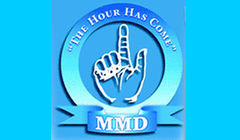Movement for Multi-Party Democracy
Movement for Multi-Party Democracy (MMD) | |
|---|---|
 | |
| Leader | Felix Mutati[1] |
| Ideology | Social democracy Third Way Progressivism |
| Political position | Centre-left |
| <templatestyles src="Plainlist/styles.css"></templatestyles> | |
The Movement for Multi-party Democracy (MMD) is a political party in Zambia. Originally formed to oust the previous government, MMD controlled an absolute majority in parliament between 1991 and 2001, when its past leader, Frederick Chiluba was President of Zambia. Its election into power in 1991 ended the 27-year rule of President Kenneth Kaunda and his United National Independence Party (UNIP). It remained the dominant party within Zambian politics until the general elections of September 2011. It is a centre-left political party.
History
Formation and government
Growing opposition to UNIP's monopoly on power, due in part to economic problems and corruption, led to the formation of the MMD in July 1990, led by Frederick Chiluba, the head of the country's trade unions.[2] During that same year, pushed by internal and international pressure, Kaunda agreed to a referendum on the one-party state, but in the face of continued opposition, dropped the referendum and signed a constitutional amendment making Zambia a multi-party state.
Multi-party general elections were held on 31 October 1991; Chiluba was elected president with 76% of the vote to Kaunda's 24%, whilst the MMD won 125 of the 150 elected seats in the National Assembly. However, by the end of Chiluba's first five-year term as president, the MMD's commitment to political reform had faded in the face of re-election demands and several prominent members left to establish other parties.
Relying on the MMD's overwhelming majority in parliament, President Chiluba in May 1996 pushed through constitutional amendments that eliminated former President Kaunda and other prominent opposition leaders from the 1996 general elections. As a result, UNIP boycotted the elections, allowing Chiluba to be easily re-elected with 73% of the vote, whilst the MMD won 131 of the 150 seats in the National Assembly. Afterward, however, several opposition parties and non-governmental organisations declared the elections neither free nor fair.
Early in 2001, supporters of President Chiluba mounted a campaign to amend the constitution to enable Chiluba to seek a third term of office; the campaign led to further breakaways from the MMD, including the Forum for Democracy and Development and the Heritage Party. Eventually civil society, opposition parties, and other MMD members exerted sufficient pressure on Chiluba to force him to back away from any attempt at a third term.
Levy Mwanawasa was selected as the MMD presidential candidate for the 2001 elections, winning with just 28% of the vote. Although the MMD remained the largest party in the National Assembly, it lost its majority after being reduced to 69 seats. Three parties submitted petitions to the High Court, challenging the election results. The petition remained under consideration by the courts in February 2003 when it was ruled that while there had been irregularities these had not been large enough to affect the outcome; thus the result was upheld. Opposition parties won a majority of parliamentary seats in the December, 2001 election, but subsequent by-elections and liberal use of government patronage to secure the support of opposition MPs gave the ruling MMD a slim majority in Parliament.
Mwanawasa was re-elected in the 2006 general elections with 43% of the vote, with the MMD winning 72 seats in the National Assembly.
Following the sudden death of Mwanawasa in August 2008, a presidential by-election was held. Rupiah Banda was chosen as the MMD candidate, and was elected with 40% of the national vote, narrowly defeating Michael Sata of the Patriotic Front (PF) by a margin of around 2%.
Opposition
However, the 2011 general elections saw Sata defeat Banda by a margin of 42%–35%, whilst the MMD won only 55 seats in the National Assembly to the PF's 60. The following year Nevers Mumba was elected as MMD president, defeating rival Felix Mutati and several other candidates.
In the 2015 presidential by-election several MMD members supported United Party for National Development candidate Hakainde Hichilema or the PF's Edgar Lungu.[3] Although Mumba opted to run, he received just 0.9% of the vote.
In May 2016, the MMD splinter group elected former Lunte MP Felix Mutati as party president at a convention at the Mulungushi Rock of Authority in Kabwe.[1]
References
External links
- ↑ 1.0 1.1 Mutati is new MMD leader, ZNBC, May 21, 2016
- ↑ Martin Lindhardt (2014) Pentecostalism in Africa: Presence and Impact of Pneumatic Christianity in Postcolonial Societies, BRILL, pp302–303
- ↑ The ruling party candidate wins in Zambia… for now. The Washington Post, 25 January 2015